
Tramontane (2016) Watch Online Free
Rabih, a young blind man, lives in a small village in Lebanon. He sings in a choir and edits Braille documents for an income. His life unravels when he tries to apply for a passport and discovers that his identification card, which he has carried his entire life, is fake. Now he must travel across Lebanon in search of his identity.
Tramontane (2017), directed by Vatche Boulghourjian, is a Lebanese drama that weaves together a complex narrative about identity, deception, and the deep scars left by war. The film centers on Rabih, a blind musician who, while applying for a passport to embark on a European tour, learns that his identity is not as he believed. His ID is fake, and his personal history is shrouded in lies and confusion. This revelation sends Rabih on a journey across Lebanon to uncover the truth about his origins, but along the way, he encounters resistance, falsehoods, and fragments of a past that refuses to be revealed.
The film is set against the backdrop of Lebanon’s post-civil war era, a time when the country’s collective memory is still fractured and its people are struggling with unspoken truths. Rabih’s quest for the truth mirrors Lebanon’s national search for healing, as it grapples with the lingering effects of war and trauma. As Rabih delves deeper into the mystery of his origins, he uncovers a series of conflicting accounts from those around him, including his adoptive mother and his uncle, who might have a dark past tied to the war. These personal revelations serve as metaphors for Lebanon’s own fractured identity, torn between a painful past and an uncertain future.
Thematically, Tramontane explores how the past, particularly the atrocities of war, can remain hidden, and how the denial of this history affects individuals and societies. Rabih’s blindness serves as a symbolic representation of Lebanon itself—blinded by years of conflict, unwilling or unable to confront the full truth of its history. His journey for self-discovery becomes a poignant reflection on the search for national and personal healing.
The film is not just a personal drama but a historical allegory, and Boulghourjian uses this complex narrative to comment on Lebanon’s collective silence surrounding its violent past. The performances are compelling, with Barakat Jabbour as Rabih offering a nuanced portrayal of a man struggling with an uncertain identity. The music, composed by Cynthia Zaven, plays a crucial role in communicating the emotional depth of the story, often filling the gaps where words fail. The haunting song “Give me an answer” encapsulates the sorrow and longing at the heart of Rabih’s search for the truth
Reasons to Watch:
How You Might Feel After Watching: Watching Tramontane will likely leave you with a mix of emotions, ranging from sadness to contemplation. The film’s exploration of identity and the scars of war can be deeply moving, especially as it unfolds the painful realization that sometimes the past remains hidden, even from those who seek it. You may feel empathy for Rabih’s struggle, and the unresolved nature of his journey might leave you pondering the broader themes of national trauma and personal discovery long after the credits roll. The film’s melancholic yet hopeful undertone is likely to provoke reflection on how we reconcile with our own histories and identities
